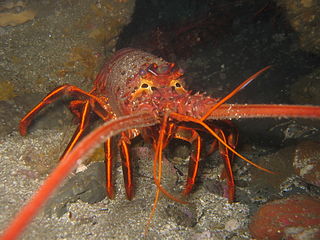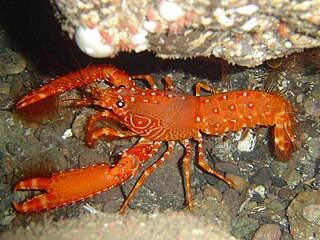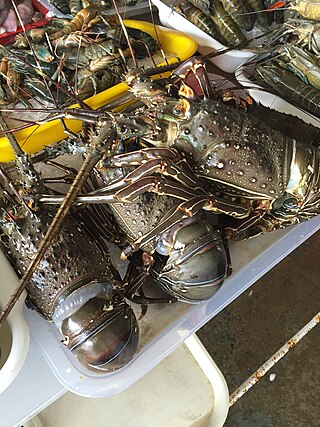
Spiny lobsters, also known as langustas, langouste, or rock lobsters, are a family (Palinuridae) of about 60 species of achelate crustaceans, in the Decapoda Reptantia. Spiny lobsters are also, especially in Australia, New Zealand, Ireland, South Africa, and The Bahamas, called crayfish, sea crayfish, or crawfish, terms which elsewhere are reserved for freshwater crayfish.

Homarus is a genus of lobsters, which include the common and commercially significant species Homarus americanus and Homarus gammarus. The Cape lobster, which was formerly in this genus as H. capensis, was moved in 1995 to the new genus Homarinus.

The California spiny lobster is a species of spiny lobster found in the eastern Pacific Ocean from Monterey Bay, California, to the Gulf of Tehuantepec, Mexico. It typically grows to a length of 30 cm (12 in) and is a reddish-brown color with stripes along the legs, and has a pair of enlarged antennae but no claws. The interrupted grooves across the tail are characteristic for the species.

Jasus edwardsii, the southern rock lobster, red rock lobster, or spiny rock lobster, is a species of spiny lobster found throughout coastal waters of southern Australia and New Zealand including the Chatham Islands. It is commonly called crayfish in Australia and New Zealand and kōura in Māori. They resemble lobsters, but lack the large characteristic pincers on the first pair of walking legs.

The Cape lobster, Homarinus capensis, is a species of small lobster that lives off the coast of South Africa, from Dassen Island to Haga Haga. Only a few dozen specimens are known, mostly regurgitated by reef-dwelling fish. It lives in rocky reefs, and is thought to lay large eggs that have a short larval phase, or that hatch directly as a juvenile. The species grows to a total length of 10 cm (3.9 in), and resembles a small European or American lobster; it was previously included in the same genus, Homarus, although it is not very closely related to those species, and is now considered to form a separate, monotypic genus – Homarinus. Its closest relatives are the genera Thymops and Thymopides.
Palibythus magnificus, sometimes called the musical furry lobster, is a species of furry lobster found in Polynesia. It is generally included in the family Palinuridae, although it has also been separated from that family with the genus Palinurellus to form the family Synaxidae in the past. The species is known in Samoan as ula moana, a name which also covers the deep-water shrimp Heterocarpus laevigatus.

Reef lobsters, Enoplometopus, are a genus of small lobsters that live on reefs in the Indo-Pacific, Caribbean and warmer parts of the Atlantic Ocean.

Panulirus is a genus of spiny lobsters in the family Palinuridae, including those species which have long flagella on their first antennae.

Palinurus is a genus of spiny lobsters in the family Palinuridae, native to the eastern Atlantic Ocean, Mediterranean Sea and western Indian Ocean. A 110-million-year-old fossil, recognisable as a member of the genus Palinurus, was discovered in a quarry in El Espinal in Mexico's Chiapas state in 1995 and named P. palaciosi.

Jasus is a genus of spiny lobsters which live in the oceans of the Southern Hemisphere. They have two distinct "horns" projecting from the front of the carapace, but lack the stridulating organs present in almost all other genera of spiny lobsters. Like all spiny lobsters, they lack claws, and have long stout antennae which are quite flexible.

Parribacus japonicus, the Japanese mitten lobster, is a species of slipper lobster. Though the common name for this lobster is the Japanese mitten lobster, it is locally called zōri-ebi (ゾウリエビ) – zōri denoting the Japanese sandal it resembles, and ebi meaning shrimp or lobster.
Galearctus is a genus of slipper lobsters, comprising the following species:

Linuparus, the spear lobsters, is a genus of medium-sized to large spiny lobsters in the family Palinuridae. It contains four extant species found at depths of 30–500 m (100–1,640 ft) in the Indo-Pacific, and 32 fossil species, ranging from the Early Cretaceous to the Oligocene. L. trigonus is the only extant species also known from the fossil record.

Palinurus charlestoni is a species of spiny lobster which is endemic to the waters of Cape Verde. It grows to a total length of 50 cm (20 in) and can be distinguished from other Atlantic species in the genus by the pattern of horizontal bands on its legs. It was discovered by French fishermen in 1963, and has been the subject of small-scale fishery since. It is thought to be overexploited, and is listed as Near Threatened on the IUCN Red List.

Panulirus ornatus is a large edible spiny lobster with 11 larval stages that has been successfully bred in captivity.

Cancrinos is a genus of fossil crustacean closely allied with the slipper lobsters. One species is known, C. claviger from the Jurassic of southern Germany.

Ibacus alticrenatus is a species of slipper lobster that lives in the waters of Australia and New Zealand.

Panulirus longipes, the longlegged spiny lobster, is a species of spiny lobster that lives on shallow rocky and coral reefs in the tropical Indo-Pacific region. The International Union for Conservation of Nature has assessed its conservation status as being of "least concern".

Panulirus femoristriga is a species of spiny lobster. It occurs in the Indian and Pacific Oceans. IUCN categorizes the species globally as of "least concern". No subspecies are listed in the Catalog of Life.

Panulirus gracilis, the green spiny lobster, is a crustacean species described by Thomas Hale Streets 1871. Panulirus gracilis is part of the genus Panulirus and the Palinuridae family. IUCN categorizes the species globally as insufficiently studied. No subspecies are listed in the Catalog of Life.
















